 Petzlover
Petzlover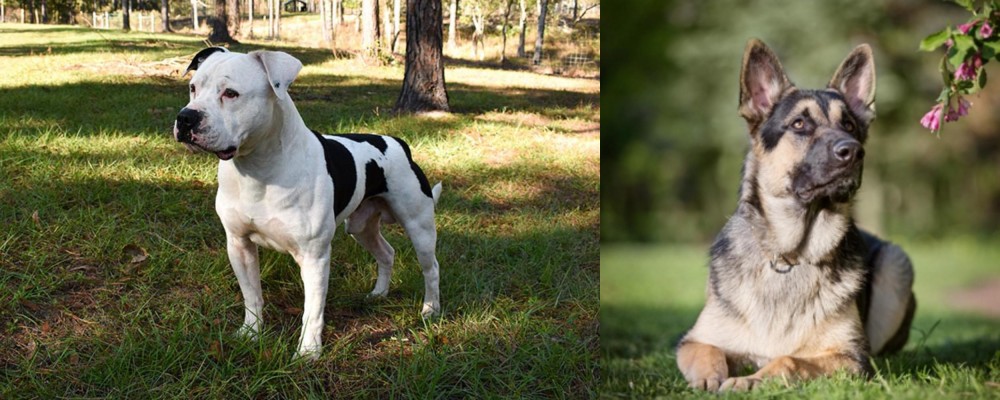 American Bulldog is originated from United States but East European Shepherd is originated from Russia. American Bulldog may grow 6 cm / 2 inches shorter than East European Shepherd. Both American Bulldog and East European Shepherd are having almost same weight. American Bulldog may live 4 years more than East European Shepherd. Both American Bulldog and East European Shepherd has almost same litter size. American Bulldog requires Low Maintenance. But East European Shepherd requires Moderate Maintenance
American Bulldog is originated from United States but East European Shepherd is originated from Russia. American Bulldog may grow 6 cm / 2 inches shorter than East European Shepherd. Both American Bulldog and East European Shepherd are having almost same weight. American Bulldog may live 4 years more than East European Shepherd. Both American Bulldog and East European Shepherd has almost same litter size. American Bulldog requires Low Maintenance. But East European Shepherd requires Moderate Maintenance
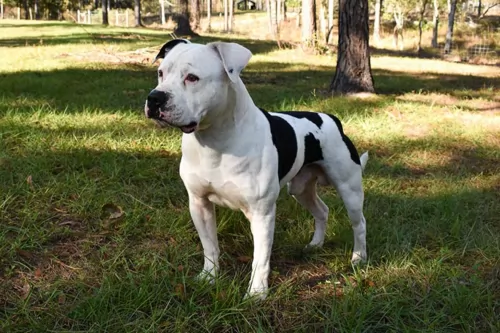 Following World War II, the American Bulldog was almost extinct.
Following World War II, the American Bulldog was almost extinct.
Thanks to John D. Johnson from Summerville, Georgia the breed is still with us today. He gathered the best dogs he could find throughout the rural South and bred them back into popularity among his family and other rural families. His father bred the American Bulldog before John did and they have bred them longer than any other in any part of the world. His dogs were regularly used for tracking, hunting, guarding, watchdog and weight pulling. At some point Alan Scott joined Johnson breeding other bulldogs to Johnson's and forming the Standard American Bulldog.
The American Bulldog/ is popular today as a family pet and companion as well as a working dog.
 The East European Shepherd is a dog which hails from Russia. The dog was developed in the 1930-1950s as there was a need for a bigger, more robust, weather-resistant type of dog who would perform all kinds of guard duties in the Soviet Union.
The East European Shepherd is a dog which hails from Russia. The dog was developed in the 1930-1950s as there was a need for a bigger, more robust, weather-resistant type of dog who would perform all kinds of guard duties in the Soviet Union.
This is a rare dog breed, created by mixing Russian breeds such as the Laika, Central Asian Shepherd and Caucasian Shepherd to create a strong working dog that could cope well with the sub-freezing conditions.
The standard breed type was established in 1964. The only major kennel club to grant full recognition to the East-European Shepherd is the Russian Kennel Club. In the United States, the dog is recognized by a number of rare breed registries.
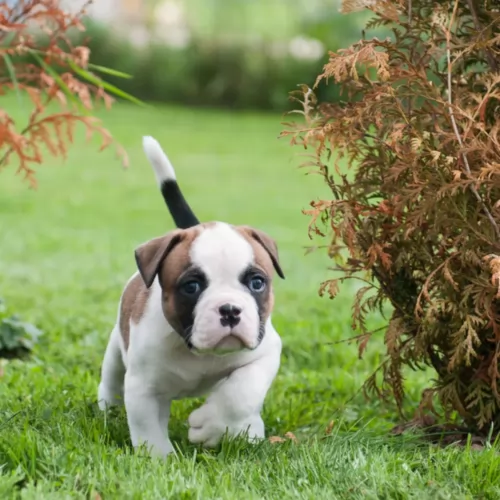 The American Bulldog is a powerful and muscular dog in a sturdy and compact frame. The female is more refined than the heavy boned and stocky male, but both genders are athletic, agile and quick. The have large heads, strong jaws, a muscular neck and with a moderately deep and wide chest.
The American Bulldog is a powerful and muscular dog in a sturdy and compact frame. The female is more refined than the heavy boned and stocky male, but both genders are athletic, agile and quick. The have large heads, strong jaws, a muscular neck and with a moderately deep and wide chest.
They have a square head, with muscular cheeks and a clearly defined furrow between his eyes. With broad, square and strong muzzles, they have a reverse scissors, scissors, moderate underbite and an even bite. Ears come in a variety of shapes and sizes and eyes can be any color as well. The nose however should be black and lips black as well. Their legs are strong, heavy boned and straight with well-defined muscles in the hindquarters. Finally ,they have a thick, low set tail that comes to a point at the end.
 The East European Shepherd is larger than a German Shepherd. He is described as a large dog with males and females standing roughly at 66-76 centimeters at the withers and weighing anything between 30–50kg.
The East European Shepherd is larger than a German Shepherd. He is described as a large dog with males and females standing roughly at 66-76 centimeters at the withers and weighing anything between 30–50kg.
The coat with undercoat is medium in length with the standard color being black-and-tan or black-and-red. The dog is solid colored or is light fawn or tan in color with black saddle.
The face of the dog is black and he looks a lot like a wolf in appearance. The ears of the East European Shepherd are medium sized and always erect.The tail is long and hangs low.
The East European Shepherd is an intelligent and confident dog and can be aggressive when aggravated. He is a working dog and to get along with other pets in the home as well as children, the East European Shepherd will need to be trained and socialized, becoming obedient and loyal with his owner.
He is an intelligent dog and training him poses no problem. Loyal and devoted, this dog mostly becomes particularly attached to one member of the family.
There are a number of dog experts who don’t recommend the dog as a family pet as it is a dog reluctant to form a close bond with a child, being irritated by them, especially ill disciplined children.
It is a strong-willed dog too and shouldn’t be the first dog choice for a novice dog owner. They make excellent guard dogs and take their role as protector of the family seriously.
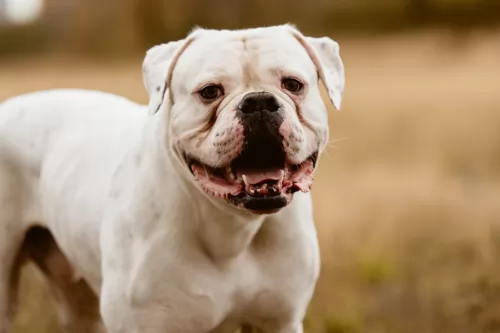 The American Bulldog is characteristically loyal, brave and reliable. It is a friendly, gentle dog that truly loves children. There is not a hostile bone in his body despite his history and reputation for bull baiting. Though he is protective of its family and affectionate with most, he still needs a human companion who is strong willed and a genuine pack leader. Without this he might become aggressive around other dogs and pets. They are immensely self-confident and they do slobber and drool and will become excited and hard to handle without daily exercise of both their body and their minds.
The American Bulldog is characteristically loyal, brave and reliable. It is a friendly, gentle dog that truly loves children. There is not a hostile bone in his body despite his history and reputation for bull baiting. Though he is protective of its family and affectionate with most, he still needs a human companion who is strong willed and a genuine pack leader. Without this he might become aggressive around other dogs and pets. They are immensely self-confident and they do slobber and drool and will become excited and hard to handle without daily exercise of both their body and their minds.
 The East-European Shepherd dogs are balanced, confident, intelligent, loving and playful while also being tough and protective of their owners.
The East-European Shepherd dogs are balanced, confident, intelligent, loving and playful while also being tough and protective of their owners.
They make fantastic guard dogs, becoming aggressive around strangers whom they don’t trust. When you bring a dog like this into the home, it is essential to have him trained and socialized and to also have a firm owner who can deal with such a strong-willed animal.
He is an active, alert dog who will require regular exercise and will slot into life in the city or in the country so long as his exercise needs are met.
When you look after your East European Shepherd you’ll find in him a devoted, loyal friend who will protect you with his life.
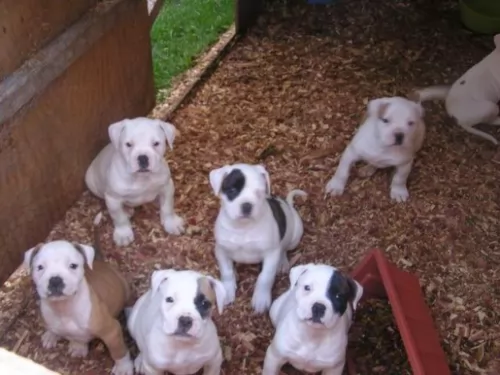 Though generally healthy, the American Bulldog is prone to a few problems.
Though generally healthy, the American Bulldog is prone to a few problems.
This is a serious issue in many breeds of dogs and is especially prevalent with the American Bull Dog. This may seem ironic in such a short legged dog but it is unfortunately very common. It is a genetic disorder that causes the bones in the joint to separate and causes the dog much pain and lameness.
Due to skin folds you need to be care and watch for irritation and infection in the folds. They are also prone to ear infections.
The American Bulldog is prone to overeating and all the health issues that presents. With short legs and a genetic predisposition to arthritis and hip dysplasia, obesity is a real health risk for your bulldog.
 Regarded as a tough dog who can reach 10 – 12 years of age, the East European Shepherd is prone to hip or elbow dysplasia. This is a a disease that is more prevalent with German Shepherd type dogs.
Regarded as a tough dog who can reach 10 – 12 years of age, the East European Shepherd is prone to hip or elbow dysplasia. This is a a disease that is more prevalent with German Shepherd type dogs.
Dysplasia is a genetic condition which can lead to inflammation and arthritis and even lameness. Unfortunately it can happen with young dogs too, and the vet will suggest different types of treatment which can include surgery.
Degenerative myelopathy is another degenerative disease which can be found with the East European Shepherd. It is a fatal, progressive degenerative disease of the spinal cord. Unfortunately there isn’t treatment for the disease, leading to paralysis of the limbs.
 The coat of the East European Shepherd is thick, and while he won’t require any professional grooming, he will require being brushed at least twice a week. This is because he sheds heavily at certain times.
The coat of the East European Shepherd is thick, and while he won’t require any professional grooming, he will require being brushed at least twice a week. This is because he sheds heavily at certain times.
His nails will need to be clipped if they don’t wear down naturally, and his teeth will require regular brushing at least 2 or 3 times a week. Fortunately, because his ears are large and open, he doesn’t easily get an ear infection.
The East European Shepherd is a dog which has always been worked. It is a highly energetic dog and its role as a guard- and herding dog has made it that the dog will require a good dose of exercise.
A long walk may not be enough for this active dog, and he will require intense ball throwing with a tennis racquet to get the ball far away so that he can run far to fetch the ball. Without enough exercise, the East-European Shepherd will develop behavioral problems which will include aggression.